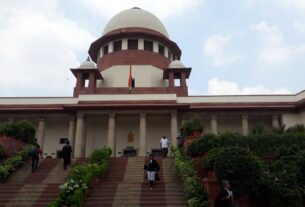The draft Lakshadweep Town and Country Planning Regulation 2021 was placed in public consultation for a period of 21 days ending on May 19 2021.
Delhi: Residents of Lakshadweep, a Union Territory (UT) in the Arabian Sea, have expressed anger and concern over a new regulation that seeks to develop rural and urban areas for proper town planning, good governance, tourism, and general welfare of the people living there.
The regulation ambiguously defines development as, “the carrying out of the building, engineering, mining, quarrying or other operations in, on, over or under, land, the cutting of a hill or any portion thereof…” It also allows the UT administration to make any material changes in any building or land, or in its use.
Althaf Hussain, a resident of Androth Island said, “The biggest island of Lakshadweep is just seven kilometers in length, which is Androth Island, how is the government saying that town planning can include highway constructions?”
Talking about development in the islands, he said that the people have their basic needs fulfilled but given it is geographically separated, they do have some limitations. However, the fact that the government can take over any land for developmental purposes is “absolutely wrong”.
Saleem, another resident, said, “This is only a small area, the people are worried about their land. They have put a special order that without permission they can acquire their land.”
The regulation empowers the administration to declare any area to be a planning area, except cantonment areas and set up a planning and development authority for that area. Such authorities can then, “acquire, hold, manage and dispose of property, movable or immovable, as it may deem necessary.” The planning and development authority can acquire land with the approval of the government and the consent of the owner.
Such bodies have to prepare an outline development plan which can allocate areas for commercial, industrial, residential, or agricultural purposes and can provide areas for existing and proposed national highways, railways, airports.
Development plans can also designate areas for natural reserves, or for public infrastructure which includes educational, health, cultural institutions, and religious buildings.
The authority would consist of a government appointed chairman, a town planning officer, three government nominated experts and two local authority representatives.
Praful Patel, administrator of Lakshadweep said that his developmental agenda for Lakhshadweep is being “misplaced” and that nothing like what people are imagining will happen, as reported by The Print.
Patel added, “Why is it that people are waiting to go to the Maldives, but are not even willing to come to Lakshadweep? It is to develop tourism and for long term benefits that we are introducing the LDAR,” The Print reported.
Althaf, in response, said, “There are 36 islands out of which only 10 are inhabitant and remaining 26 are not. If they want to develop tourism I request the government to please go to the remaining 26 ones. Why are they coming to the populated islands? The administration is trying to take away all the powers of the locally elected panchayats as they want to have a monopoly over Lakshadweep.”
Lakshadweep, India’s smallest Union Territory is an archipelago of 36 islands with a total area of 32 sq km. The islands are located about 220 to 440 km away from Kochi, Kerala. Entry to the island is regulated; all non-natives require entry permission signed by the UT administration to visit the islands.
The Kerala High Court stayed an order on May 25 2021 which had called Assistant Public Prosecutor Amini to be present in Kavaratti, capital of Lakshadweep, to do their legal work, as LiveLaw reported. Justice Vinod Chandran told the counsel for Lakshadweep Administration orally that the court is keeping a check on the affairs of the island.
Dr. Maharaj Pundit, professor of environmental science at the University of Delhi said that “Conservation versus development is a very old debate. How much should I leave for future generations and how much development should we go for.”
He added, “We cannot cut both ways; one has to find a middle path in all of this. Development projects too are necessary as the natives also have a right to modern amenities of life whether they are schools, hospitals, and roadways. But at the same time, you cannot destroy the last remaining corners of diversity in the country. That must be also kept in mind.”




